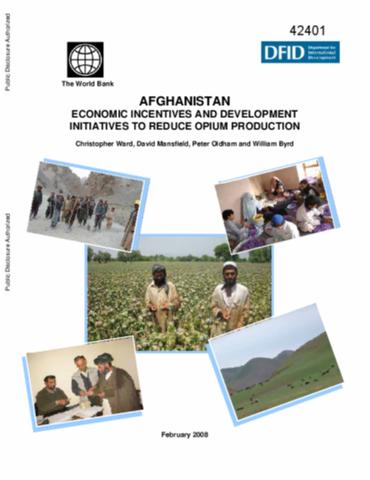The World Bank is a vital source of financial and technical assistance to developing countries around the world. We are not a bank in the ordinary sense but a unique partnership to reduce poverty and support development. The World Bank Group has two ambitious goals: End extreme poverty within a generation and boost shared prosperity.
- To end extreme poverty, the Bank's goal is to decrease the percentage of people living on less than $1.25 a day to no more than 3% by 2030.
- To promote shared prosperity, the goal is to promote income growth of the bottom 40% of the population in each country.
The World Bank Group comprises five institutions managed by their member countries.
The World Bank Group and Land: Working to protect the rights of existing land users and to help secure benefits for smallholder farmers
The World Bank (IBRD and IDA) interacts primarily with governments to increase agricultural productivity, strengthen land tenure policies and improve land governance. More than 90% of the World Bank’s agriculture portfolio focuses on the productivity and access to markets by small holder farmers. Ten percent of our projects focus on the governance of land tenure.
Similarly, investments by the International Finance Corporation (IFC), the World Bank Group’s private sector arm, including those in larger scale enterprises, overwhelmingly support smallholder farmers through improved access to finance, inputs and markets, and as direct suppliers. IFC invests in environmentally and socially sustainable private enterprises in all parts of the value chain (inputs such as irrigation and fertilizers, primary production, processing, transport and storage, traders, and risk management facilities including weather/crop insurance, warehouse financing, etc
For more information, visit the World Bank Group and land and food security (https://www.worldbank.org/en/topic/agriculture/brief/land-and-food-security1
Resources
Displaying 4786 - 4790 of 4907Afghanistan : Economic Incentives and Development Initiatives to Reduce Opium Production
This report is about how to progressively reduce over time Afghanistan's dependence on opium - currently the country's leading economic activity - by development initiatives and shifting economic incentives toward sustainable legal livelihoods. Specifically, the report identifies additional investments and policy and institutional measures to support development responses that can counterbalance the economic advantages of opium.
Making the most of scarcity: accountability for better water management results in the Middle East and North Africa
Part of a series of development reports, this paper highlights the key challenges facing the Middle East and North Africa Region (MENA). In particular, it aims to show how water is integrated into the wider economic policies of the countries of the region and for that reason, it brings water issues to non-water specialists, addressing a multi-sectoral audience. It is argued that despite its diversity of landscapes and climates - from the snowy peaks of the Atlas mountains to the empty quarter of the Arabian peninsula - most of the region’s countries cannot meet current water demand.
From Agriculture to Nutrition: Pathways, Synergies and Outcomes
In a world of food abundance, millions of people suffer from poor nutrition. In some parts of the world, the poor have inadequate access to energy from food to meet their energy requirements. In these locations, food shortage is often a seasonal phenomenon and micronutrients are also generally lacking in the diet. Elsewhere, there is a stable supply of energy but the poor have monotonous diets lacking in essential micronutrients.
From Agriculture to Nutrition: Pathways, Synergies and Outcomes
In a world of food abundance, millions of people suffer from poor nutrition. In some parts of the world, the poor have inadequate access to energy from food to meet their energy requirements. In these locations, food shortage is often a seasonal phenomenon and micronutrients are also generally lacking in the diet. Elsewhere, there is a stable supply of energy but the poor have monotonous diets lacking in essential micronutrients.
Azerbaijan - Farm Privatization Project, and Agricultural Development and Credit Project
Ratings for the Farm Privatization Project for Azerbaijan are as follows: outcome was satisfactory; risk to the development outcome was moderate; Bank performance was satisfactory; and Borrower performance was highly satisfactory. Ratings for the Agricultural Development and Credit Project for Azerbaijan are as follows: outcome was satisfactory; risk to the development outcome was significant; Bank performance was satisfactory; and Borrower performance was also satisfactory.









